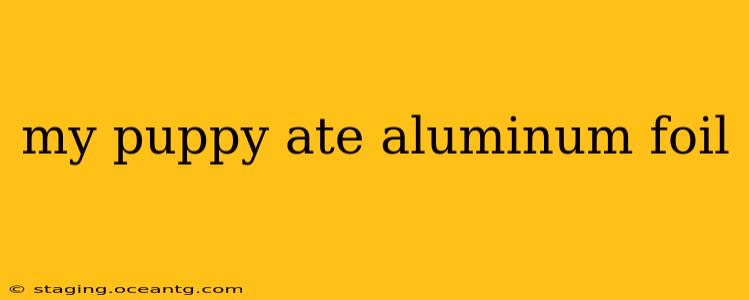Finding out your puppy has ingested aluminum foil can be incredibly alarming. While a small piece might pass through their system without incident, larger amounts or sharp pieces pose a significant risk. This guide will address your immediate concerns and provide crucial information about what to do if your puppy has eaten aluminum foil.
What Happens If a Puppy Eats Aluminum Foil?
Aluminum foil itself isn't highly toxic, but several dangers are associated with its ingestion. The primary concerns are:
- Obstruction: Large pieces of foil can get lodged in the esophagus, stomach, or intestines, causing a blockage. This is a serious veterinary emergency requiring immediate intervention. Symptoms can include vomiting, lethargy, loss of appetite, and abdominal pain.
- Sharp Edges: Folded or crumpled foil can have sharp edges that can cut or irritate the digestive tract, leading to internal bleeding or perforation.
- Toxicity: While aluminum isn't highly toxic in small amounts, prolonged exposure or large ingestions can potentially lead to aluminum toxicity, though this is rare with a single ingestion of household foil.
My Puppy Ate a Small Piece of Aluminum Foil – Should I Worry?
If your puppy ate a very small, smooth piece of foil, it might pass through their system without issue. However, monitoring is crucial. Watch for any changes in their behavior or bowel movements. If you notice any of the symptoms mentioned above, contact your veterinarian immediately.
My Puppy Ate a Large Piece of Aluminum Foil – What Should I Do?
This is a veterinary emergency. Do not induce vomiting at home. This could worsen the situation, potentially causing further damage. Contact your veterinarian or an emergency animal hospital immediately. They will assess your puppy's condition and determine the best course of action, which may include:
- X-rays: To determine the location and size of the foil.
- Surgery: In cases of obstruction or perforation.
- Medication: To help the foil pass through the system.
How Can I Prevent My Puppy from Eating Aluminum Foil in the Future?
Prevention is key. Here are some tips to keep your puppy safe:
- Secure Trash Cans: Use tightly sealed trash cans or store them in inaccessible areas.
- Careful Food Prep: Clean up any foil scraps immediately after cooking or using foil to wrap food.
- Supervise Your Puppy: Keep a close eye on your puppy, especially when they're exploring new areas or scavenging.
- Training: Train your puppy with positive reinforcement methods to avoid eating non-food items.
What are the Symptoms of Aluminum Foil Ingestion in Puppies?
Symptoms can vary depending on the amount ingested and the size and shape of the foil. Watch for:
- Vomiting: This is a common sign of intestinal distress.
- Diarrhea: Changes in bowel movements can indicate irritation or blockage.
- Lethargy: Your puppy may seem unusually tired or inactive.
- Loss of Appetite: A decrease in appetite is a significant warning sign.
- Abdominal Pain: Your puppy may whine, cry, or show signs of discomfort when touching their abdomen.
- Constipation: Difficulty passing stool can indicate a blockage.
Is Aluminum Foil Poisonous to Dogs?
Aluminum foil itself isn't highly toxic, but the risks associated with ingestion, as outlined above, make it a serious concern. The potential for obstruction and perforation is the primary danger.
Should I induce vomiting if my puppy eats aluminum foil?
No. Never induce vomiting in your dog without explicit instructions from a veterinarian. Doing so can cause further complications. Contact your vet or emergency animal hospital immediately.
Remember, always prioritize your puppy's safety. If you suspect they've ingested aluminum foil, seek veterinary attention promptly. Early intervention can significantly improve the outcome. This information is for educational purposes only and should not be considered veterinary advice. Always consult with a qualified veterinarian for any health concerns related to your pet.
